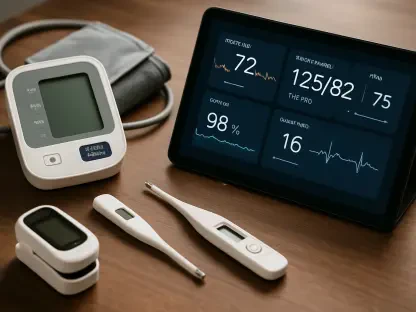Increasing attention is being given to prostate cancer surveillance, particularly the integration of innovative imaging technologies into the process. Weill Cornell Medicine has taken a significant step forward with its clinical trial funded by a $4 million grant from the National Cancer Institute. This trial is designed to assess the effectiveness of incorporating prostate-specific membrane antigen (PSMA) positron emission tomography (PET) computed tomography (CT) scans into current prostate cancer monitoring protocols. The primary objective of this research is to determine whether this advanced imaging technique can enhance the surveillance process by reducing unnecessary biopsies and better identifying the need for treatment in certain cases.
The Role of PSMA-PET CT in Active Surveillance
Evaluating the Potential Benefits
The PSMA-PET CT represents a potentially transformative technology in the area of prostate cancer management. By deploying a radioactive diagnostic agent, this imaging technique targets specific proteins found on prostate cells, which are present at higher concentrations in cancerous cells. This method is particularly advantageous as it facilitates the precise tracking of both metastasis and remission in high-risk individuals. A key element of active surveillance is to avoid overtreatment while still managing the disease effectively. PSMA-PET CT could refine existing protocols by enhancing specificity and sensitivity, which are crucial factors in accurately determining the necessity for treatment.
The trial will encompass the involvement of 200 male participants diagnosed with low-risk or intermediate-risk prostate cancer and will be conducted at NewYork-Presbyterian/Weill Cornell Medical Center along with four additional sites. The research team, led by Dr. Timothy McClure, is optimistic that PSMA-PET CT can improve patient outcomes by offering a clearer picture of which cancers require intervention. This aligns with ongoing efforts in the medical community to personalize cancer care, reducing patient harm and maximizing therapeutic efficacy.
Trial Design and Expected Outcomes
This extensive study seeks not only to monitor cancer progression but also to revolutionize how decisions regarding treatment are made. With advancements in imaging, particularly with PSMA-PET CT, clinicians might be able to make more informed decisions, potentially reducing unnecessary invasive procedures like biopsies. The importance of this research is underscored by its goal: to decrease the physical and emotional burden on patients who are under active surveillance strategies. By providing more precise information on cancer progression, the trial aims to streamline decision-making processes and reduce uncertainties for patients and healthcare providers alike.
This trial, supported by the production capabilities of Lantheus and backed by the National Cancer Institute, is indicative of a broader strategy to leverage novel technologies and partnerships to evolve cancer diagnostics. It underscores an important shift from traditional methods and emphasizes a patient-centered approach that combines cutting-edge science with compassionate care. If successful, the trial could pave the way for wider implementation of PSMA-PET CT, potentially changing the landscape of prostate cancer management globally.
Collaboration and Future Prospects
Integrating Multidisciplinary Efforts
One of the key aspects of this trial is the collaborative approach that Weill Cornell Medicine is adopting. By engaging experts from the departments of radiology and pathology, the study is set to benefit from a multidisciplinary perspective. This comprehensive framework aims to drive innovation in cancer detection and management practices. Collaborative efforts often yield insights that might not emerge from working in siloed environments, and this trial is a testament to the potential of such cooperation. By aligning with diagnostic agent producers and federal research bodies, the trial is poised to offer an integrated approach to tackling one of the most prevalent cancers affecting men worldwide.
This initiative reflects Weill Cornell Medicine’s commitment to not only advancing medical research but also aligning with broader healthcare goals. In recent years, their work has extended into developing blood tests for cancer detection using whole-genome sequencing. Such endeavors highlight the institution’s dedication to employing innovative techniques that promise to enhance early detection and tailor treatments to individual healthcare needs.
Implications for Patient Care
The successful implementation of PSMA-PET CT into regular prostate cancer surveillance could have significant implications for patient care. If the trial demonstrates clear benefits, it could potentially shift the standard of care, encouraging other institutions to adopt similar practices. This could lead to a significant reduction in unnecessary procedures, lowering costs, and improving the quality of life for patients under surveillance. As the realm of cancer surveillance evolves, strategies like PSMA-PET CT could become integral in stratified patient management, ensuring that interventions are as targeted and effective as possible.
The findings from this trial are expected to influence policy and practice on a broader scale, contributing to the global dialogue on optimal cancer care strategies. By aligning cutting-edge research with patient welfare, the trial not only promises advancements in prostate cancer management but also sets a precedent for future research endeavors.
Advancing Cancer Detection Technologies
The Promise of Innovation
The advancement of prostate cancer surveillance methodologies through technologies like PSMA-PET CT represents a significant stride in oncology. This trial highlights the importance of continual innovation and evaluation in medical practices, ensuring that patient care evolves in tandem with scientific progress. Modern technologies provide the tools necessary to refine surveillance and treatment plans, minimizing patient distress, and optimizing outcomes. As researchers continually strive to enhance accuracy and efficacy, such technologies could herald a new era in cancer management.
By focusing on enhanced detection and tailored treatments, innovation continues to push the boundaries of what is possible in patient care. Effective incorporation of the latest imaging and diagnostic techniques holds promise not only for prostate cancer but for oncology as a whole. These efforts stress the essential nature of investing in research to fuel future breakthroughs in cancer care.
Looking Ahead
There’s been heightened focus on advancing prostate cancer surveillance, notably through the integration of cutting-edge imaging technologies. Weill Cornell Medicine is spearheading a pivotal clinical trial, generously backed by a $4 million grant from the National Cancer Institute. This groundbreaking trial aims to evaluate the benefits of incorporating prostate-specific membrane antigen (PSMA) positron emission tomography (PET) CT scans into the current methodologies for monitoring prostate cancer. The foremost aim is to ascertain whether these sophisticated imaging technologies can refine the surveillance process, thereby minimizing unnecessary biopsies and more precisely identifying which patients require treatment. This alignment of advanced imaging with existing protocols could revolutionize prostate cancer surveillance, offering enhanced accuracy in diagnosing and managing the disease. If successful, this approach promises a significant impact on patient care by streamlining monitoring and ensuring timely treatment interventions.









